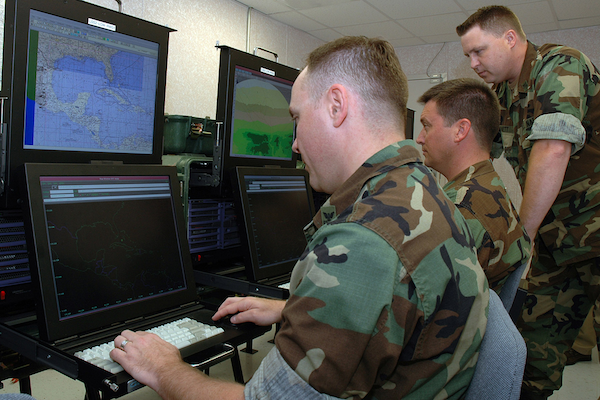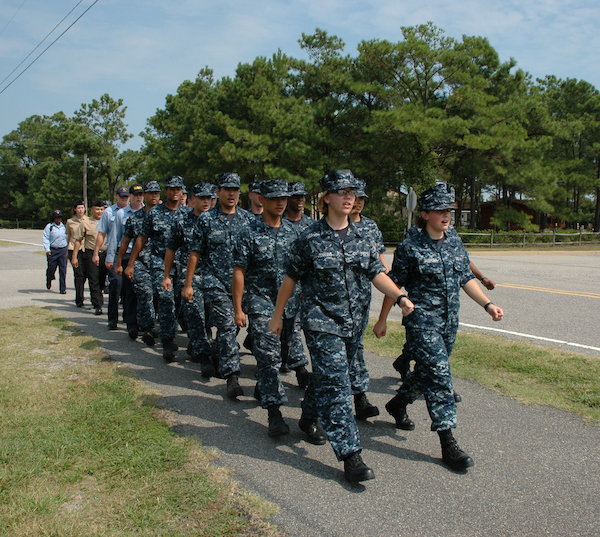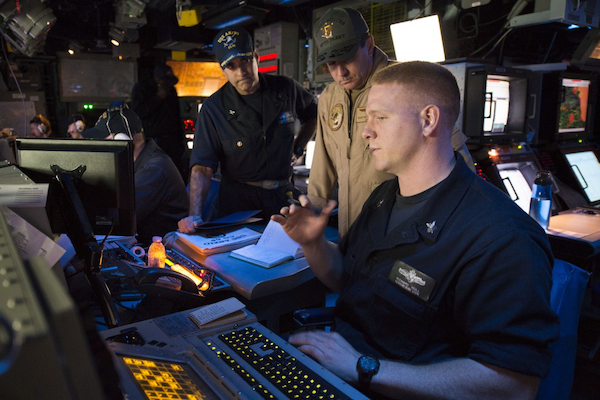An Intelligence Specialist is a Sailor who analyzes military intelligence data and communicates important information extrapolated from intelligence material to be used in the planning of military operations.
Intelligence is considered as any classified information regarding any foreign entity.
Intelligence Specialists analyze and classify intelligence data to determine its potential effectiveness for military operations.
Using this intelligence information, ISs prepare reports and conduct intelligence briefings that provide detailed descriptions of the important characteristics of strategic and tactical zones all over the world.

Jump To A Section
Who Can Be an Intelligence Specialist?
An Intelligence Specialist is a highly specialized and detail-oriented rating.
Applicants should have a solid understanding of mathematics and should be able to read, write, and communicate easily and without assistance.
The following is a list of basic requirements for all candidates to the Intelligence Specialist rating:
- Must have a high school diploma or equivalent
- Must have a combined ASVAB line score of VE + AR = 107
- Must have normal color perception
- Must have vision correctable to 20/20
- Must be capable of obtaining and maintaining a Top Secret / Sensitive Compartmented Information (TS/SCI) clearance
- Applicant and immediate family members must be United States Citizens
- Must conduct personal security screening interview with a special representative of Naval Security Group Command Detachment Great Lakes
Because of their high security clearance, and the level of sensitivity involved with their work, Intelligence Specialists must meet certain moral turpitude standards.
These standards are generally not waiverable and may result in an application denial to the Intelligence Specialist rating:
- Drug-related convictions
- Drug use in the three years prior to application
- Repeated offenses involving alcohol
- Serious indebtedness
- Any criminal offense that is sexual in nature
- Domestic violence convictions
Related Article: Can You Join The Military With A Felony?
Intelligence Specialist Training and Qualifications
Boot Camp
The first step in your Intelligence Specialist training will be attending Recruit Training, more commonly referred to as boot camp.
Navy Recruit Training takes place at Recruit Training Command Great Lakes in Great Lakes, Illinois.
Here, Recruit Division Commanders (RDCs) will teach you the basic military skills and knowledge necessary to begin work in the United States Navy.
While at RTC Great Lakes, you will also learn basic Navy ship handling, small arms usage, firefighting, and Naval heritage.
Barring any unforeseen circumstances, this training normally lasts about 8 weeks.

“A” School
Upon completion of Navy Recruit Training, you will travel to Dam Neck, Virginia.
Here you will attend the IS Accession School (also known Navy A School), at Navy and Marine Corps Intelligence Training Center at Dam Neck.
During this 13-week course of study, you will learn the basic principles of:
- Data analysis
- Information gathering
- Intelligence equipment
- Report writing
- Briefing skills
- Photography
- Drafting
- Topography
Once you have graduated from IS “A” School, you will officially be designated as a Navy Intelligence Specialist.
Related Article – Navy PRT Standards For Males and Females
“C” School
Now that you are officially an Intelligence Specialist, you will be given orders to attend the IS Continuation School (commonly known as “C” School), for 5-13 weeks at Navy and Marine Corps Intelligence Training Center Dam Neck.
Life as an Intelligence Specialist
As an Intelligence Specialist, you may receive orders to a large ship, an aircraft squadron, or one of the various intelligence centers located in the United States, and across the globe.
The work is mostly analytical in nature and supports Naval intelligence in all facets. Typically, duties are performed in an office type environment where you will often work as part of a team, but you must be capable to operate without supervision.
You will spend most of your time analyzing intelligence data and preparing and presenting intelligence briefings and providing maps and charts to produce imagery data in direct contribution to mission planning.
You will also be arranging the material necessary for vital military reconnaissance operations.
The majority of your job will involve you inputting and receiving data from encrypted intelligence systems and maintaining intelligence file databases and document libraries.

Sea/Shore Rotation
In the Navy, you will swap between deployable “sea” duties and generally nondeployable “shore” duties.
There are situations where these rotations can change, but as a general rule, the Navy will do everything in its power to ensure all Sailors are able to meet their proper sea/shore rotations.
The sea to shore assignment rotation for Intelligence Specialists is as follows:
- First sea tour will be 36 months
- First shore tour will be 36 months
- Second sea tour will be 36 months
- Second shore tour will be 36 months
- Third sea tour will be 36 months
- Third shore tour will be 36 months
- Fourth sea tour will be 36 months
- Fourth shore tour will be 36 months
Pay and Compensation
Your pay is going to be based on a combination of your rank and time in service.
Intelligence Specialists will generally be somewhere around the paygrade of E-3 with right at a year of service once they become rated.
This means your starting base yearly salary could be roughly $23,774 as an E-3 with fewer than two years and max out at $89,698 as an E-9 with 30 years of service.
This, of course, does not include Basic Allowance for Housing (BAH), or Basic Allowance for Subsistence (BAS).
IS’s will receive Sea Pay while they are attached to a Navy ship.
This amount is based on your rank and amount of time you have at sea.
The amount can range from $50 a month as an E-3 and below with less than a year at sea, to $750 a month as an E-9 with eight or more years at sea.
Related Article: Navy Enlisted And Officer Ranks And Pay
Again, this does not factor in your BAH or BAS allowances.
BAH alone can range from $7,452 to $62,748 a year depending on your rank, marital status, and where you live.
Although it fluctuates semi-annually, Intelligence Specialists typically enjoy a significantly higher advancement opportunity than the Navy average.
This means your advancement capability as an Intelligence Specialist will have you climb the ranks faster than the average Navy career, putting more money in your pocket sooner.

Civilian Opportunities
Intelligence Specialists are highly trained personnel who leave the Navy with a unique set of skills. Skills that are difficult to come by in the civilian world.
This places ISs in a unique position coming out of the Navy, where many of them are offered jobs before they even separate.
The following are some of the civilian careers in which Intelligence Specialists find employment:
- Data analysts
- Investigators
- Mapping technicians
- Civil drafters
- Cartographers
- Computer systems analysts
- Geographers
- Operations research analysts
- Software developers
- Surveying technicians
Related Article: 10 Best Jobs In The Navy For Civilian Life
Because of their high security clearance, Intelligence Specialists can often find jobs within the federal government agencies, specifically:
- Federal Bureau of Investigation (FBI)
- Department of Homeland Security (DHS)
- National Security Administration (NSA)
- Central Intelligence Agency (CIA)
Civilian Education
Through the Navy Credentialing Opportunities On-Line (COOL) program, Intelligence Specialists have the ability to earn credentials they can use in the civilian world. For free, they may earn certifications as:
- Certified Geospatial Information Society (GIS) Technologist
- Certified Mapping Scientist GIS (ASPRS)
- Certified Photogrammetric Technologist
- Certified Remote Sensing Technologist
- IC3 Digital Literacy Certification
- International Computer Driving License
Additionally, Intelligence Specialists can earn apprenticeship designations from the Department of Labor through the United States Military Apprenticeship Program (USMAP) as a certified apprentice in the following fields:
- Corrections Officer
- Counselor
On top of all that, there is Active Duty Tuition Assistance and the GI Bill.
Tuition Assistance will pay up to $250 a credit, for 12 credits a year, and a total of 120 credits over a lifetime.
The Post 9/11 GI Bill provides 36 months of tuition, an annual book stipend, and Basic Allowance for Housing.
In line with their professional training, Intelligence Specialists are awarded semester credit hours in the following areas:
- Applied mathematics
- Basic photography
- Computer concepts
- Drafting and design
- Technical writing
- Office practices
Related Article – American Military University (AMU) Reputation: Worth It?
What is it Like to be an Intelligence Specialist?
Intelligence Specialists play a vital role in every phase of the planning, collection, processing, analysis, and dissemination of Naval intelligence.
ISs assemble and analyze operational intelligence to support all of the Navy’s warfare areas.
They draft intelligence reports and provide intel briefings, data reporting, and analytical program management.
Intelligence Specialists are responsible for preparing intelligence material necessary for mission planning.
These materials include the preparation of annotated photographs, plot sheets, mosaics, overlays, interpretation keys, charts, and maps.
A career as an Intelligence Specialist is high tempo and can sometimes be very stressful, but this doesn’t stop those in this career from enjoying their jobs.
Most Intelligence Specialists love their job so much that they end up staying in and retiring from the Navy, and the ones that do leave early usually only do so because they have been offered a lucrative job in the civilian world.
If you like the idea of telling your friends and family that you work in Naval intelligence (like James Bond), or if you are looking for a rewarding Navy career that is going to provide excellent civilian career opportunities when your Navy career ends, then a Navy Intelligence Specialist is the job for you!
Related Article – Navy Jobs List: A List Of All 71 Ratings In The US Navy
Resources
Navy IS Informational Brochure
- Navy Promotion Timeline for Enlisted & Officers - June 19, 2024
- Navy SEAL Training (BUD/S) - June 19, 2024
- Navy Aircraft Carrier Flight Deck Shirt Colors Explained - June 19, 2024
General FAQ
Where do Navy intelligence specialists get stationed?
A Navy Intelligence Specialist works primarily in an office or watch station but may find themselves stationed onboard Navy vessels or at any intelligence office overseas or in the United States.
How long is a school for a Navy Intelligence Specialist?
After an eight-week boot camp, a Navy Intelligence Specialist will attend A-school for 13 weeks at the training center at Dam Neck, Virginia. You’ll then attend C-School, which lasts between 5 to 13 weeks, also at Dam Neck.
How many intelligence specialists are in the Navy?
As of 2018, there were nearly 3,000 Intelligence Specialists enlisted in the U.S. Navy.
What is the average salary of a Navy Intelligence Specialist?
Navy personnel are paid according to rank and time in service, with new sailors making about $20,000 per year before housing allowance or Sea Pay.
What ASVAB scores do you need to become a Navy Intelligence Specialist?
To qualify as a Navy Intelligence Specialist, you’ll need a combined score for Verbal Expression and Arithmetic Reasoning of 107 minimum.
